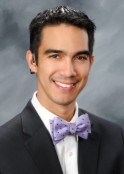Empathetic Researcher for Hearing Loss
 Dr. Samuel Atcherson’s principle line of research focuses on how the auditory
Dr. Samuel Atcherson’s principle line of research focuses on how the auditory
system processes simple and complex sounds using non-invasive, objective
brain-recording techniques. What external reviewers have not indicated about
Dr. Atcherson is that he has a longstanding profound hearing loss since early
childhood. His personal experiences with hearing loss, hearing aid amplification,
and cochlear implants have all resulted in professional research and clinical
inquiries about how hearing loss, aging, and various auditory disorders negatively
impact the perception of sound.
Dr. Atcherson has produced an outstanding record of scholarship since starting at UA Little Rock. He currently has 21 published articles in peer-reviewed journals and an additional 30 published articles in non-refereed journals. He has four invited book chapters and has published a scholarly book on auditory electrophysiology, which is used in Doctor of Audiology programs across the country. Dr. Atcherson has made more
than 80 professional presentations. His national reputation is evidenced by his 11 peer-reviewed invitations to present at national meetings and 25 invitations to speak at regional meetings. Dr. Atcherson has had three grants funded. The first grant, “The effect of aging and noise on neurophysiologic representation of speech,” was funded by the UAMS Medical Research Endowment Foundation. The second grant, “A comparison of spectral modulation thresholds obtained psychophysically and using scalp-recorded auditory evoked potentials,” was funded by the American Speech-Language-Hearing Association. Lastly, the third grant, titled “Evaluation of the HEARLabTM Cortical Evoked Potential System in Bone-Anchored Implant (BAI) Users” was funded by the UAMS College of Health Professions Dean’s Society.
Dr. Atcherson’s degrees include a Ph.D. in audiology and speech pathology from the University of Memphis, a M.Ed. in audiology from the University of Georgia, and a B.S.Ed. in communication sciences and disorders from the University of Georgia.